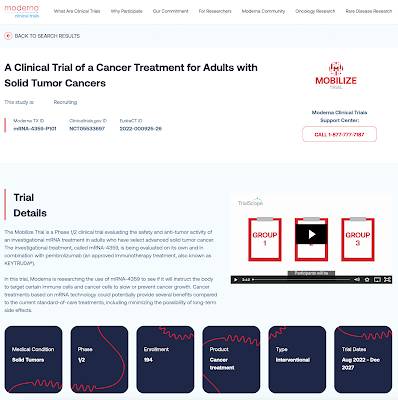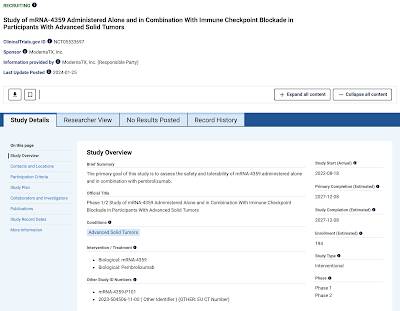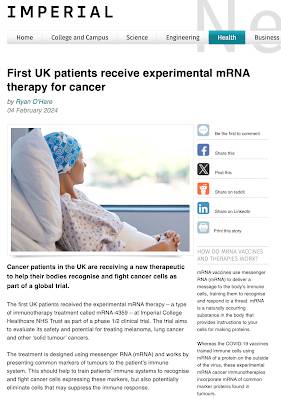
Our mRNA Vaccine Future – The Cure-All For Whatever Ails Us
During the pandemic, mRNA vaccine technology took centre stage in the battle against the SARS-CoV-2 vaccine, the first time that the technology was used in anything but relatively small laboratory trials. Despite the growing evidence that these vaccines were responsible for a significant number and variety of adverse side effects and that they weren’t terribly effective at preventing the spread of COVID-19, this would appear to have opened the door to even wider use of mRNA vaccines.
Here is a screen capture from Moderna’s clinical trials website recalling that Moderna was the purveyor of the Spikevax COVID mRNA vaccine:
This Phase 1/2 clinical trial will evaluate the safety and efficacy of the company’s mRNA-4359 vaccine which is being designed to slow or prevent the growth of solid tumour cancers in adults. Apparently, preclinical testing in both cell and animal models of cancer provided initial evidence that the mRNA-4359 vaccine had an impact on the immune system which provided the rationale necessary for it to be offered in Phase 1/2 clinical trials.
Participants in the study must:
1.) Be 18 years of age or older
2.) Have confirmed locally advanced or metastatic cancer – Includes: cutaneous melanoma, NSCLC, non-muscle invasive bladder cancer, head and neck squamous cell carcinoma, MSS CRC, basal cell carcinoma, or triple-negative breast cancer – Also includes: confirmed locally advanced or metastatic melanoma or NSCLC who have received previous checkpoint inhibitor therapy
3.) Have experienced disease progression after receiving standard-of-care therapies or be intolerant to standard-of-care treatment
Participants that have active central nervous system tumours or metastases are excluded from the study.
Participants are expected to attend 17 visits to the trial site over three years with a treatment period of approximately 6 months followed by a 90 day safety followup and a two year followup period. The vaccine will be administered as an intramuscular injection and pembrolizumab will be administered intravenously. I found it interesting that this Phase 1/2 trial is taking three years to
complete (not including a further Phase 3 trial) whereas the trials prior to the rollout of the COVID-19 mRNA vaccines took place in less than a year.
Participants will be assigned to one of three treatment Arms as follows:
1.) Arm 1a
This group will aim to treat adults who have locally advanced or metastatic cancer (cutaneous melanoma, non-small-cell lung carcinoma [NSCLC], non-muscle invasive bladder cancer, head and neck squamous cell carcinoma, microsatellite stable colorectal cancer [MSS CRC], basal cell carcinoma, or triple negative breast cancer) who have previously received treatment for their cancer.
Participants assigned to Arm 1a will receive the investigational treatment.
The goal of Arm 1a is to determine a safe dose of the investigational treatment.
2.) Arm 1b
This group will include adults who have locally advanced or metastatic melanoma or NSCLC who previously received immunotherapy (called checkpoint inhibitor therapy) for their cancer.
Participants assigned to Arm 1b will receive the investigational treatment in combination with pembrolizumab.
The goal of Arm 1b is to determine a safe dose of the investigational treatment in combination with pembrolizumab.
3.) Pharmacodynamic Arm
In addition to the goals of Arm 1b, researchers will also be evaluating how the investigational treatment and pembrolizumab affect the immune system and the cancer in a group called the Pharmacodynamic (PD) Arm.
Participants enrolled in the PD Arm will receive the investigational treatment and will also be asked to provide additional blood and tissue samples.
Here is the study overview from the U.S. government’s Clinical Trials website:
The study is a non-randomized trial meaning that all patients receive the same treatment. It is also open-label meaning that clinicians and patients know what Arm of treatment that they are receiving unlike blinded trials where patients do not know their course of treatment. You’ll also note that there is no placebo group.
Imperial College in the United Kingdom, home of COVID-19 pandemic modeller Professor Neil Ferguson, author of a flawed report which led directly to the global pandemic lockdown, recently announced the following:
In the United Kingdom, the trial is being run in partnership between Imperial College London and Imperial College Healthcare NHS Trust. The first patient to receive the mRNA-4359 vaccine was injected in late October 2023
In late March 2024, Modern also announced that it was advancing three of its mRNA vaccines to late-stage clinical trials including vaccines for cytomegalovirus (CMV), Epstein-Barr virus (EBV), herpes simplex virus (HSV) and Varicella-Zoster virus (VZV) (i.e shingles). Among the trials for additional mRNA vaccines, we find the following:
1.) CMV – CMVictory is a pivotal Phase 3 trial evaluating mRNA-1647 against primary CMV infection in women 16 to 40 years of age. The trial is a randomized, observer-blind, placebo-controlled study designed to evaluate the efficacy, safety and immunogenicity of mRNA-1647. The trial is fully enrolled with approximately 7,300 participants from 290 clinical sites globally.
2.) EBV – Moderna’s EBV vaccine candidates are designed to tackle multiple EBV-associated conditions, including prevention of IM (mRNA-1189) and MS and post-transplant lymphoproliferative disorder, a subcategory of lymphoma in solid organ transplant patients (mRNA-1195). The Phase 1 trial for mRNA-1189 was designed to test the safety, reactogenicity and immunogenicity of four different dose levels in participants 12 to 30 years of age in the U.S. The randomized, observer-blind, placebo-controlled study showed mRNA-1189 was immunogenic and generally well tolerated across all dose levels. The Company is advancing mRNA-1189 toward a pivotal Phase 3 trial.
The Phase 1 trial for mRNA-1195 was designed to test the safety, reactogenicity and immunogenicity of two drug products at four different dose levels in healthy EBV seropositive participants 18 to 55 years of age in the U.S. The randomized, observer-blind, placebo-controlled study is fully enrolled.
3.) HSV – The first in human, fully enrolled Phase 1/2 trial of mRNA-1608 is designed to test safety and immunogenicity and to establish a proof-of-concept of clinical benefit in adults 18 to 55 years of age with recurrent HSV-2 genital herpes. The randomized 1:1:1:1, observer-blind, controlled study is fully enrolled with 300 participants in the U.S.
4.) VZV – Moderna’s VZV vaccine candidate mRNA-1468 has initial data available from a Phase 1/2 trial, which was designed to test safety and immunogenicity in healthy adults 50 years of age and older in the U.S. The randomized 1:1:1:1:1, observer-blind, active-controlled study of mRNA-1468 elicited strong antigen-specific T cell responses at one month after the second dose and was generally well tolerated. Results of the first interim analysis support the further clinical development of mRNA-1468 for the prevention of shingles. Additional results from the ongoing Phase 1/2 study will be available later this year, including persistence data. The Company is planning for a pivotal Phase 3 trial.
Modern is also awaiting regulatory approvals for mRNA-1345, the company’s Respiratory Syncytial Virus (RSV) vaccine candidate which is currently undergoing at Phase 2/3 randomized, observer-blind, placebo-controlled, case-driven trial.
Looking at human illness through the Moderna lens, one can see that the mRNA vaccine experiment on humanity will continue unabated. Moderna would have us believe that this newly commerciallized technology is the solution to whatever ails us and seems quite capable of ignoring the long list of potential adverse health effects of this technology that are being observed by clinicians and physicians around the world. Nonetheless, it’s full speed ahead when it comes to mRNA technology.



Be the first to comment